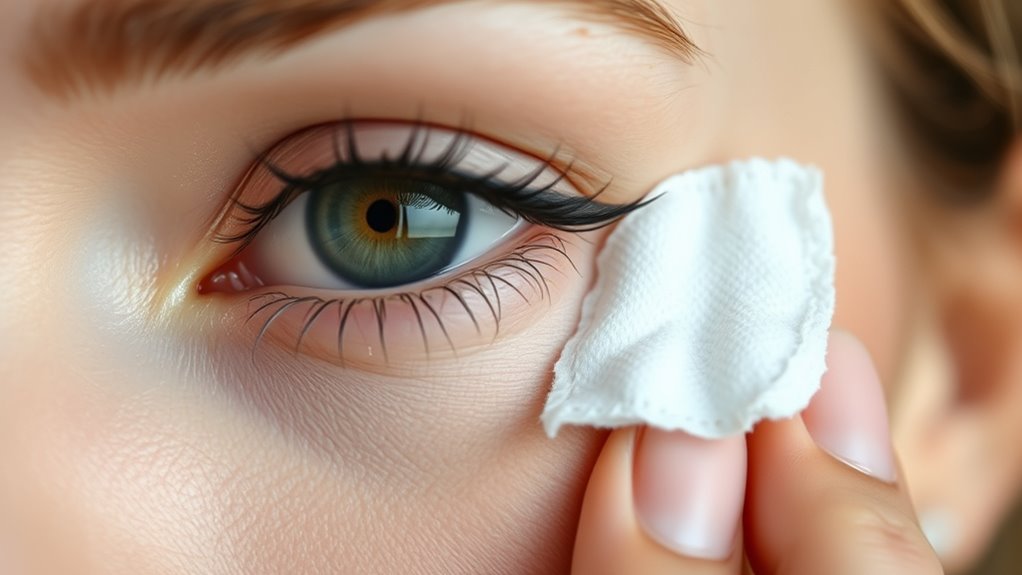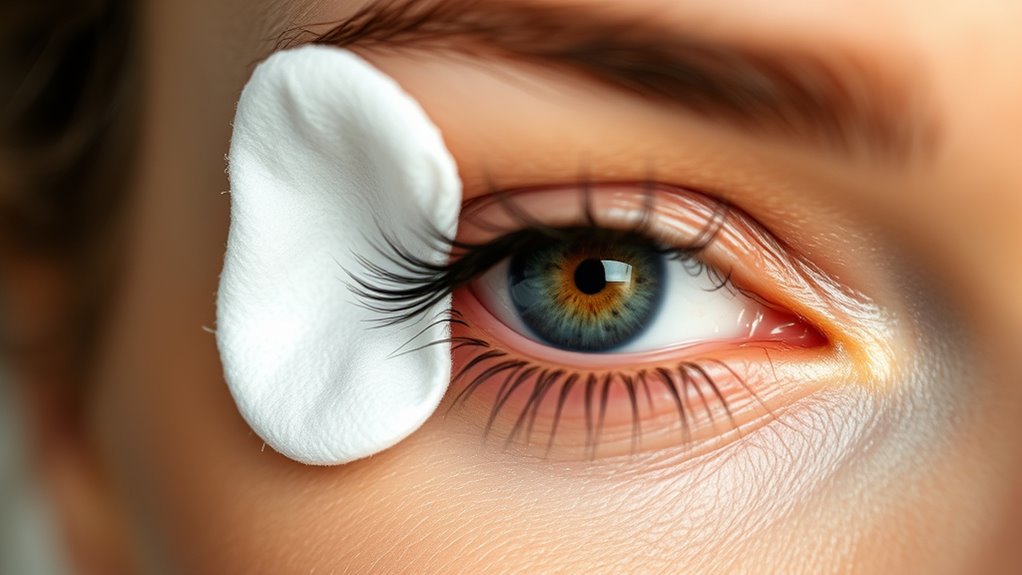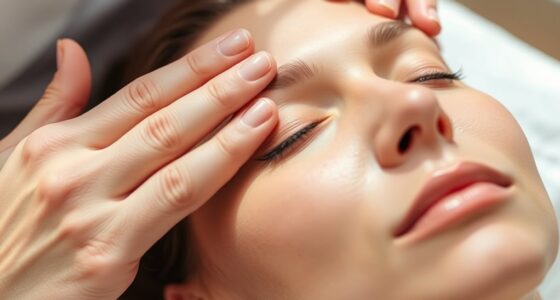Forgetting gentle techniques and rushing makeup removal can harm your eyes and skin. Rubbing or tugging around delicate areas causes irritation and damage, especially if you don’t use a proper remover or skip thorough rinsing. Sleeping with makeup on blocks oil glands, increasing the risk of infection and breakouts. Ongoing mistakes like these can sabotage eye health over time. Keep these tips in mind, and you’ll discover effective ways to protect your eyes while removing makeup.
Key Takeaways
- Rushing or scrubbing aggressively can damage delicate skin and cause irritation around the eyes.
- Failing to maintain eye contact during removal may lead to excessive pressure and eyelid stretching.
- Using harsh or inappropriate makeup removers can irritate eyes and weaken lashes.
- Not rinsing thoroughly leaves residue that can clog pores and cause infections.
- Sleeping with makeup on blocks oil flow, increasing risk of eye infections and skin issues.

Removing makeup seems simple, but many people unknowingly make mistakes that can harm their skin. One of the most common errors involves neglecting gentle cleansing techniques, especially around the delicate eye area. When you rush through makeup removal, you might tug or rub your skin excessively, which can cause irritation and damage over time. Instead, focus on gentle cleansing. Use a soft, damp cloth or a gentle makeup remover designed for sensitive skin, and avoid scrubbing aggressively. This helps to lift off makeup without stressing your skin or causing unnecessary friction.
Another mistake often made is failing to maintain eye contact with your reflection during removal. Looking into the mirror helps you stay aware of the areas you’re cleaning, ensuring you don’t miss spots or accidentally rub too hard. When you keep eye contact, you’re more likely to use gentle motions and be mindful of how much pressure you’re applying. This is especially important around the eyes, where the skin is thin and prone to damage. Using your fingertips or a cotton pad, gently press and wipe without pulling or stretching the skin.
Maintaining eye contact during makeup removal promotes gentle, mindful cleansing around delicate eye skin.
Many people also overlook the importance of removing eye makeup separately, especially mascara and eyeliner. These products tend to be more stubborn and require specific attention. If you try to remove eye makeup in one swift motion, you risk smudging makeup into your eyes or irritating the cornea. Instead, use specialized eye makeup removers that are safe for sensitive eyes. Apply the remover to a cotton pad and hold it against your closed eyelid for a few seconds before gently wiping away. This allows the product to dissolve makeup gently, reducing the need to scrub or irritate the eye area.
It’s also a mistake to neglect the importance of rinsing thoroughly. Residual makeup remover or leftover makeup can clog pores and cause irritation. After using a gentle cleanser or remover, rinse your face with lukewarm water to guarantee no residue remains. This step helps prevent buildup that could lead to breakouts or eye irritation. Proper rinsing ensures that the skin remains clear and healthy, as well as protecting the eyes from potential irritation caused by leftover products.
Finally, avoid sleeping with makeup on, particularly around your eyes. Makeup remnants can block tiny oil glands and cause inflammation, leading to issues like styes or conjunctivitis. Making these small adjustments—using gentle cleansing techniques, maintaining eye contact, paying attention to eye makeup removal, and rinsing thoroughly—can considerably protect your eye health and keep your skin looking fresh and healthy. Regularly cleaning your tools also plays a vital role in preventing bacteria buildup and skin infections around your eyes.
Frequently Asked Questions
Can Makeup Removal Cause Permanent Eye Damage?
Makeup removal can cause permanent eye damage if you’re not careful. If you don’t remove makeup properly, you risk eye infections or even corneal damage. Harsh rubbing or using dirty tools can introduce bacteria or irritate your eyes, leading to long-term issues. Always use gentle, suitable products and avoid aggressive scrubbing to protect your eye health and prevent lasting damage.
Are There Specific Ingredients to Avoid When Removing Eye Makeup?
You might think all makeup removers are safe, but avoiding products with harsh chemicals and artificial fragrances is essential. These ingredients can irritate your eyes or cause long-term damage. Always check labels and choose gentle, fragrance-free formulas designed for sensitive eye areas. Even natural-looking makeup deserves careful removal to protect your eye health. By being mindful of ingredients, you help prevent irritation and preserve your vision.
How Often Should I Replace My Eye Makeup Remover?
You should replace your eye makeup remover every three to six months, considering its product shelf life. Over time, preservatives can lose effectiveness, reducing preservative safety and increasing the risk of bacterial growth. Regularly replacing your remover ensures you’re using a fresh product that’s safe for your eyes and maintains its effectiveness. Always check the packaging for specific expiration dates and discard it if it smells or looks different.
Is It Safe to Use Makeup Remover on Contact Lenses?
Imagine your contact lenses gliding smoothly over your eyes, untouched by harsh chemicals. You wonder if makeup remover is safe for contact lens safety and compatibility. Generally, it’s best to avoid using makeup remover directly on contact lenses, as it can cause irritation or damage. Always remove makeup before inserting lenses and choose products specifically designed for use around the eyes and contact lenses, ensuring both safety and comfort.
What Are the Signs of Eye Irritation From Removal Products?
If your eyes feel ocular redness or eye discomfort after removing makeup, these are signs of irritation. You might notice your eyes are more sensitive, itchy, or there’s a burning sensation. You could also see increased tearing or swelling. Pay attention to these symptoms and avoid rubbing your eyes. If irritation persists, it’s best to consult an eye care professional to prevent further damage and guarantee proper treatment.
Conclusion
Remember, prevention is better than cure. By avoiding these common makeup removal mistakes, you protect your eye health and keep your eyes bright and beautiful. Don’t let small errors turn into bigger problems—after all, a stitch in time saves nine. Take your time, be gentle, and stick to a proper routine. Your eyes will thank you for it, now and in the long run. Stay mindful, and keep your eye health in check!









